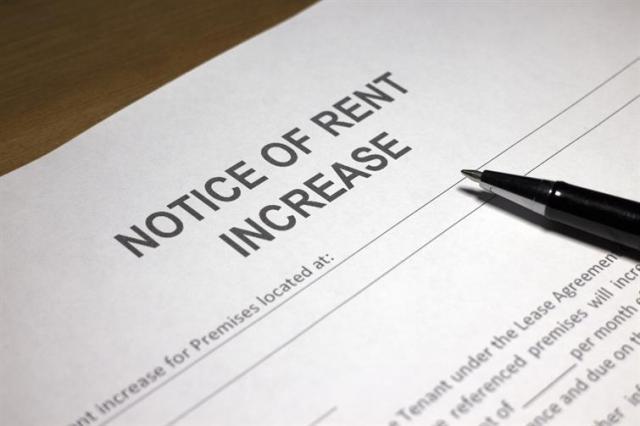Your lease is coming to an end, and the inevitable is happening – your rent is increasing (cue the dramatic sighs). I know, I’m right there with you, but a yearly percentage increase in rent is typical for most apartment complexes and rental properties. It keeps the apartment in line with other rentals in the area so that owners, landlords, or property managers aren’t offering their rentals at a cost that’s too affordable, meaning that they’re actually losing money by not administering a yearly rent increase. Luckily, rent increases can’t be implemented mid-lease, so you won’t have to worry about it until the end of your rental agreement when the question of “to move or to renew?” arises.
The yearly rent increase will likely come with a renewal notice you’ll receive when the end of your lease is near – so prepare yourself. On the plus side, this rent increase is usually only around 2 to 4%, depending on the area you live in. But even a slight increase in rent could make you love your apartment a little less – that’s understandable. You loved it for the rent you’re currently paying, not with the extra $40 a month (could be more, could be less). But before you make any rash decisions, you’ll need to compare the cost of your increased rent with potential moving costs and move-in fees at your new place.
Reasons to Move
There are plenty of reasons for you to move after you receive a rent increase notice about your current apartment. If the rent increase is beyond 4%, or if the amount is just too large for you to bear, then you should probably consider moving out. If you can find a better deal in another area (that’s still commutable to work, close to friends and family, etc.), then I suggest you do so. It’s never a good idea to spend more on rent than you can afford.
It’s likely you’ll be able to find a great apartment somewhere else for a better price. And if you live in the suburbs, the cost of rent and hiring movers is often lower than in the city – not to mention if you have a car or two to load up your belongings in, and some family or friends willing to help, moving will be much easier and less costly. And hey – if you weren’t happy in your apartment to begin with, then this rent increase is just one more reason to find your perfect apartment elsewhere.
The Cost of Moving
The cost of moving varies based on the moving company, how many movers you need, how long you need them, what size moving truck you need, where you live, how far you’re moving – the list goes on. However, I’ll give you a few estimates to go off of. If you plan to move locally, as in not to a different state, then local companies typically charge around $25-$50 per hour per mover. On average, it can take three movers about six or so hours to move a two-bedroom apartment – that’s going to cost you anywhere from $450 to $900.
Or, if you’re feeling empowered and think you can do the move yourself (or with the help of a few loved ones), try renting a moving truck and doing the heavy lifting without hiring a moving company. Typically, you can get a moving van for a flat rate of about $20, with larger trucks coming in at $30 to $40 a day, with an approximate 59 to 99 cent charge per mile. This is a much better option if you’re able to move your furniture on your own, as well as pack and unpack without the help of a moving company. And if you’re an apartment dweller moving a short distance (who isn’t a hoarder), then you can likely accomplish the move with a moving truck, a few friends, and a lot of energy!
Now, when you actually find a new apartment to replace the one charging you an increased rental rate, remember that you’re going to have to start all over with new fees. When you move into your next apartment, the landlord or property manager will likely require the first month’s rent (potentially the first and last), a security deposit, application fee, administration fee, and other potential fees such as a pet fee, storage fee, parking fee, etc. And don’t forget about the installation fee for cable and Wi-Fi, gas, electricity, and other utilities. Wowza! That’s a lot of fees, and let me tell you – they add up fast. So don’t think that moving into a new apartment to get away from increased rent at your old place is going to save you money – it may not.
Just remember, most apartments increase their rent by a small percentage on a yearly basis, so you may be leaving one increase for an impending other. If you choose to move, ask your new landlord or property manager what their average yearly rental rate increase is to be sure you’re making the right decision – and watch out for any red flags on your new lease agreement!
Reasons to Renew
Love your apartment? I feel the same! So if a relatively small (2 to 4%) increase comes with my renewal notice when the time comes, I’ll likely choose to stay where I am. However, if the increase were to become larger, I’d have to consider my options. If you love your apartment and the rent increase matches the average increase for the area (making it bearable), then consider staying put.
If you live in a major city, it’s probable that major rent increases will come along with it – it’s a common practice and one you’re better off getting used to sooner rather than later. It’s important to consider the median price of rent in the area. After the increase, if your monthly rent still costs less than the average cost of rent in the neighborhood or city you live in, stay where you are! If you choose to renew your lease rather than move to another apartment, you can attempt to negotiate not only the rent, but other terms of your lease as well, such as the omission of a renewal fee or the ever-dreaded pet rent.
The Cost of Renewing Your Lease
The cost of renewing your lease is as simple as this – you’ve chosen to pay the increased cost of rent. Whether it’s an extra $10 or $100 a month, try not to sweat it. If you love your apartment and dislike the idea of moving (it’s a hassle – I’m aware), then it will be worth it to pay the extra rent, especially if your apartment community offers luxury amenities such as a swimming pool, fitness center, or dog park – all perks that keep you content with calling this place home. Once you find a rental that truly does feel like home, it’s hard to leave. But if the price isn’t right, it may be time to trek on to greener pastures and do what’s right for you (and your bank account) and find your next apartment at a more affordable cost. Best of luck to you, my fellow renters!






